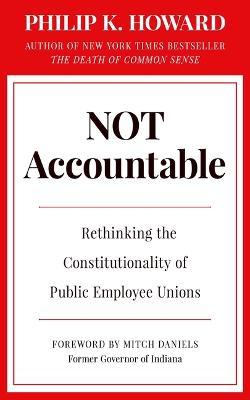Not Accountable: Rethinking the Constitutionality of Public Employee Unions

Not Accountable: Rethinking the Constitutionality of Public Employee Unions
"Elected leaders come and go, but public unions just say no." Hiding in plain sight is a fatal defect of modern democracy. Public employee unions have a death grip on the operating machinery of government. Schools can't work, bad cops can't be fired, and politicians sell their souls for union support. With this searing five-point indictment, Philip K. Howard argues that union controls have disempowered elected executives and should be unconstitutional. Union power in government happened almost by accident in the 1960s, ostensibly to give public unions the same bargaining rights as trade unions. But government bargaining is not about dividing profits, but making political choices about public priorities. Moreover, the political nature of decision-making allowed unions to provide campaign support to friendly officials. Public bargaining became collusive. The unions brag about it: "We elect our own bosses." Sitting on both sides of the bargaining table has allowed public unions to turn the democratic hierarchy upside down. Elected officials answer to public employees. Basic tools of good government have been eliminated. There's no accountability, detailed union entitlements make government largely unmanageable and unaffordable, and public policies are driven by what is good for public employees, not what is good for the public. Public unions keep it that way by brute political force--harnessing the huge cohort of public employees into a political force dedicated to preventing the reform of government. The solution, Howard argues, is not political but constitutional. America's republican form of government requires an executive branch that is empowered to implement public policies, not one shackled to union controls. Public employees have a fiduciary duty to serve the public and should not be allowed to organize politically to harm the public. This short book could unlock a door to fixing a broken democracy. Common Good (www.commongood.org) is a nonpartisan reform coalition to simplify government and restore common sense in daily decisions. It proposes a new governing vision: replace red tape with individual accountability. Its Founder and Chair is lawyer and author Philip K. Howard.
PRP: 136.34 Lei
Acesta este Prețul Recomandat de Producător. Prețul de vânzare al produsului este afișat mai jos.
109.07Lei
109.07Lei
136.34 LeiLivrare in 2-4 saptamani
Descrierea produsului
"Elected leaders come and go, but public unions just say no." Hiding in plain sight is a fatal defect of modern democracy. Public employee unions have a death grip on the operating machinery of government. Schools can't work, bad cops can't be fired, and politicians sell their souls for union support. With this searing five-point indictment, Philip K. Howard argues that union controls have disempowered elected executives and should be unconstitutional. Union power in government happened almost by accident in the 1960s, ostensibly to give public unions the same bargaining rights as trade unions. But government bargaining is not about dividing profits, but making political choices about public priorities. Moreover, the political nature of decision-making allowed unions to provide campaign support to friendly officials. Public bargaining became collusive. The unions brag about it: "We elect our own bosses." Sitting on both sides of the bargaining table has allowed public unions to turn the democratic hierarchy upside down. Elected officials answer to public employees. Basic tools of good government have been eliminated. There's no accountability, detailed union entitlements make government largely unmanageable and unaffordable, and public policies are driven by what is good for public employees, not what is good for the public. Public unions keep it that way by brute political force--harnessing the huge cohort of public employees into a political force dedicated to preventing the reform of government. The solution, Howard argues, is not political but constitutional. America's republican form of government requires an executive branch that is empowered to implement public policies, not one shackled to union controls. Public employees have a fiduciary duty to serve the public and should not be allowed to organize politically to harm the public. This short book could unlock a door to fixing a broken democracy. Common Good (www.commongood.org) is a nonpartisan reform coalition to simplify government and restore common sense in daily decisions. It proposes a new governing vision: replace red tape with individual accountability. Its Founder and Chair is lawyer and author Philip K. Howard.
Detaliile produsului










